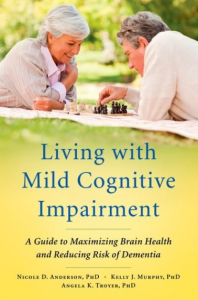Living with mild cognitive impairment: A guide to maximizing brain health and reducing dementia risk
Anderson ND (Team 10 co-Lead, Team 5 member, COMPASS-ND site PI), Murphy KJ (Team 10 member), & Troyer AK (Team 10 member)
One in ten adults over 65 has some form of mild cognitive impairment or MCI – thinking problems that go beyond those associated with normal aging, but that fall short of the serious impairments experienced by people with Alzheimer”s Disease and other dementias. This is the first book written specifically for individuals with MCI, for their loved ones, and for the health care professionals who treat them. Written by three clinicians and researchers who have devoted their careers to MCI patients, this book provides up-to-date and reliable information on the nature of this disorder, how it may affect people, and what can be done about it. The authors explain how MCI is diagnosed and treated and they offer advice on how to improve cognitive health through diet and exercise, through social engagement, and through the use of practical, effective memory strategies. Throughout, case studies illustrate the real-life issues facing people living with MCI. The book includes “Questions to Ask Your Doctor,” recommended readings and links to relevant websites, and worksheets to guide readers through healthy lifestyle changes.
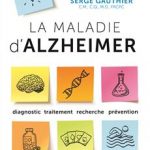 La maladie d’Alzheimer
La maladie d’Alzheimer
Poirier J (Blood and CSF Working Group), Gauthier S (Team 2, COMPASS-ND and CanThumbsUp Platforms), Éd. Trécarré
Le diabète est-il un facteur de risque pour la maladie d’Alzheimer? Quels sont les tests pour une personne que l’on soupçonne d’avoir la maladie d’Alzheimer? Existe-t-il de nouveaux médicaments plus puissants? Alors que le vieillissement de la population se poursuit au Québec et en Occident et qu’un nombre grandissant de proches aidants sont aux prises avec des parents qui souffrent et qui ont besoin de soutien, Judes Poirier et Serge Gauthier ont tenu à rassembler les plus récentes informations factuelles et fiables sur la maladie d’Alzheimer.
Cet ouvrage constitue un survol de l’actualité tant médicale que scientifique de la maladie; il décrit les derniers progrès – et les revers – de la recherche pharmaceutique, les causes et les traitements, les approches préventives en développement et les habitudes de vie scientifiquement validées qui pourraient ralentir ou entraver l’apparition des symptômes. Pour tous ceux et celles qui cherchent à comprendre ce phénomène de plus en plus répandu.
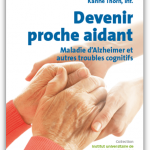 Devenir proche aidant: maladie d’Alzheimer et autres troubles
Devenir proche aidant: maladie d’Alzheimer et autres troubles
Kergoat MJ (COMPASS-ND Platform member), Latour J, Thorn K, Coll IUGM.
À l’annonce d’un diagnostic de maladie d’Alzheimer ou d’une maladie apparentée, le choc est immense pour la personne atteinte. L’entourage, de son côté, devine qu’un exigeant parcours de soutien se dessine devant lui. Comment y faire face? Ce guide se veut une main tendue aux proches aidants. Grâce à lui, ils pourront mieux comprendre la maladie et intervenir auprès de celui ou celle qui est atteint, notamment en ce qui concerne les défis que représentent les activités de la vie courante. L’ouvrage aborde également la communication, la gestion des symptômes et des comportements associés, l’hospitalisation, l’hébergement et les aspects légaux.
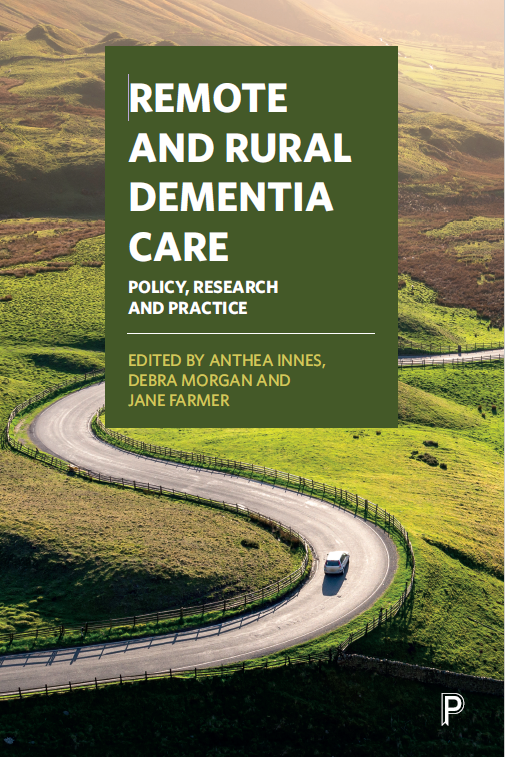
Remote and rural dementia care: Policy, Research and Practice
Innes, A., Morgan, D. (Team 15 co-Lead), Farmer, J. (Eds.). (2020). Policy Press, Bristol University.
As the number of people affected by dementia continues to rise, this is the first in-depth examination of related services dedicated to the unique demands of remote and rural settings. Contributors from the UK, Australia, North America and Europe explore the experiences and requirements of those living with dementia and those caring for them in personal and professional capacities in challenging geographical locations. This book is an essential review of evidence and strategies to date, and a guide to future research needs and opportunities for improvements in rural dementia practice.
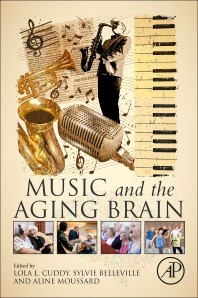 Music and the Aging Brain
Music and the Aging Brain
Cuddy L, Belleville S (Team 10 co-Lead), Moussard A. (Eds). (2020), Academic Press.
Music and the Aging Brain describes brain functioning in aging and addresses the power of music to protect the brain from loss of function and how to cope with the ravages of brain diseases that accompany aging. By studying the power of music in aging through the lens of neuroscience, behavioral, and clinical science, the book explains brain organization and function. Written for those researching the brain and aging, the book provides solid examples of research fundamentals, including rigorous standards for sample selection, control groups, description of intervention activities, measures of health outcomes, statistical methods, and logically stated conclusions.
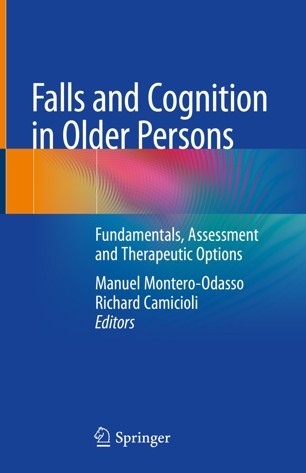 Falls and Cognition in Older Persons
Falls and Cognition in Older Persons
Montero-Odasso, M , Camicioli R. (Eds), with participation of CCNA members Ken Rockwood, Olga Theou, Olivier Beauchet, Mark Speechley, Teresa Liu-Ambrose, Louis Bherer, Karen Z. H. Li, and William Mcilroy, (2020), Springer, Cham.
This book provides practical tools for fall prevention in cognitively impaired older adults. The text presents a comprehensive and state-of-the-art update that covers the pathophysiology, epidemiology, and clinical presentation of the event, which affects up to 60 percent of aging patients with cognitive impairment. Written by transdisciplinary experts in experts in geriatric medicine, rehabilitation, neurology, and physiotherapy, the text presents practical, evidence-based guidelines for the assessment, approach, and treatment of these patients and includes illustrations and resources for quick reference.
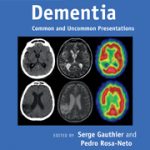 Case Studies in Dementia: Common and Uncommon Presentations
Case Studies in Dementia: Common and Uncommon Presentations
Gauthier, S, and Rosa-Neto, P (Eds), with participation of CCNA members Paige Moorhouse, Sylvie Belleville, Morris Freedman, Ian Mackenzie, Robert Hsuing, Mario Masellis, Sandra Black, Louis Verret, Neil Cashman, Eric Schmidt, and Marie-Christine Guiot. (2011) Cambridge University Press
Dementia is amongst the greatest challenges facing the medical profession as the population ages. Accurate diagnosis is essential as many rarer forms of the disease are treatable if recognized early. This collection of case studies from around the world illustrates both common and unusual causes of dementia, emphasizing clinical reasoning, integrative thinking and problem-solving skills. Each case consists of a clinical history, examination findings and special investigations, followed by diagnosis and discussion. The aim is to reinforce diagnostic skills through careful analysis of individual presenting patterns, and to guide treatment decisions, using state-of-the-art diagnostic classification and tools. The reader will be able to distinguish patients who need reassurance, closer follow-up or immediate referral to specialized services. Written and edited by internationally recognized experts in dementia, these case studies will inform and challenge clinicians at all stages of their careers.
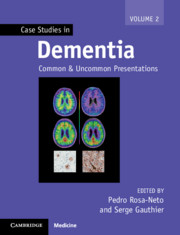
Case Studies in Dementia: Common and Uncommon Presentations (Volume 2)
Gauthier, S, and Rosa-Neto, P (Eds), with participation of CCNA members Paige Moorhouse, Robert Jr Laforce, Louis Verret, Ian Mackenzie, Robert Hsuing, Simona Maria Brambati, Michel Panisset and Morris Freedman. (2021) Cambridge University Press

